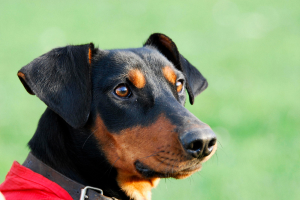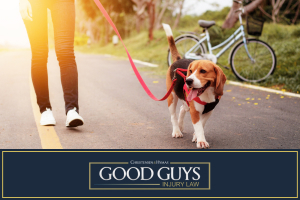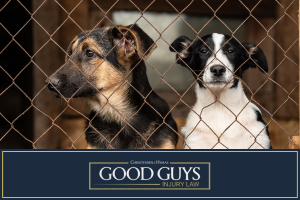
In Utah, dog laws are designed to protect both the public and animals. They cover a myriad of topics, from licensing and leash requirements to owners’ liability for bites and attacks. These laws help ensure that dogs live safely within communities while also protecting people from harm. Understanding these regulations is essential for all dog owners and those who interact with dogs.
The state of Utah takes dog regulations seriously to promote a safe community for both pets and people. At Good Guys Injury Law, we understand that individuals and families in Utah love their dogs. We are here to go through some of the laws that impact how people should take care of their pets. Learn more about Utah dog laws below. Then, contact us to schedule a case consultation.
Table of Contents
Overview of Utah Dog Laws
Utah dog laws aim to balance the freedom and well-being of dogs with the safety and comfort of the community. They oversee how owners are obligated to attend to their dogs, encompassing mandates for licensing, vaccination, and restraint. These laws also outline the consequences for owners if their dogs cause harm or become a nuisance. By comprehending and adhering to these rules, dog owners can play a role in creating a safer community for all.
Licensing and Registration Requirements
In Utah, all dog owners must license their pets with their local municipality. This process usually requires proof of rabies vaccination and a small fee. Licensing aids in reuniting lost dogs with their owners and bolsters local animal control initiatives. Dog owners need to renew their pet’s license annually to comply with state laws.
Statewide Leash Laws and Local Ordinances
Utah does not have a statewide leash law, but many cities and counties require dogs to be on a leash when off their owner’s property. These community regulations strive to deter dogs from wandering without restraint, minimizing the risk of accidents or aggression. Dog owners should familiarize themselves with the leash laws in their area to avoid fines and ensure the safety of their pets and others.
Rabies Vaccination and Health Regulations

Rabies vaccination is mandatory for all dogs in Utah. This law protects public health by preventing the spread of this deadly virus. Owners must vaccinate their dogs against rabies according to a schedule set by state law, which typically requires a first vaccination at around four months of age, followed by regular boosters.
Mandatory Rabies Vaccination Schedule
The first rabies vaccination must occur when a dog is no more than four months old. After the initial shot, the dog needs a booster within one year and every three years after that. These requirements ensure that dogs remain protected against rabies, safeguarding both animal and human health. Owners should keep vaccination records as they may need to present them for licensing or in case of a bite incident.
Failure to vaccinate a dog against rabies not only endangers the pet and the public but can also result in fines for the owner. Owners must follow the vaccination schedule closely and consult with a licensed veterinarian for the best care. Regular vaccinations help keep dogs healthy and prevent the spread of diseases within communities.
Health Certificate Requirements for Dogs
Owners must have a current health certificate when traveling with a dog or bringing a new dog into Utah. This certificate, printed and signed by a licensed veterinarian, states that the dog is free from contagious diseases. It typically includes information about the dog’s rabies vaccination and general health status.
The health certificate is an important tool for preventing the spread of disease. It assures that a dog entering a new area does not bring in illnesses that could affect local animal populations. Owners planning to travel with their dogs should obtain a health certificate shortly before their trip to ensure it reflects the dog’s current health status.
Other Common Vaccines Necessary for Utah Dogs
Apart from rabies, dogs in Utah should receive vaccinations for diseases like distemper, parvovirus, and hepatitis. These vaccines are crucial for a dog’s health and can prevent serious illnesses. A licensed veterinarian can recommend a vaccination schedule based on the dog’s age, health, and lifestyle.
Keeping up with these vaccinations protects the dog and prevents the spread of diseases to other animals. Regular veterinary check-ups and vaccinations are essential parts of responsible dog ownership. They help ensure that dogs live long, healthy lives and do not pose a risk to other pets or people.
Liability for Dog Bites and Attacks
Utah law holds dog owners liable for any harm their pets cause. This includes injuries from bites or attacks, regardless of the dog’s previous behavior. The law aims to encourage responsible pet ownership and ensure victims of dog attacks can receive compensation for their injuries. If you have been bitten by a dog, see a doctor first. Then, contact us to schedule a case consultation.
Understanding Owner Liability and Criminal Negligence
Typically, the owner is deemed accountable when a dog bites or assaults someone. This is true even if the dog has never shown aggression before. The concept is to encourage owners to be proactive in averting their dogs from causing harm. Owners need to take reasonable steps to control their pets and prevent incidents that could lead to injuries.
If an owner is aware of their dog’s aggressive behaviors but fails to take appropriate precautions, they can be found negligent. This could mean facing more severe consequences, including higher fines or legal action. Responsible pet ownership involves understanding your dog’s behavior and taking steps to ensure it doesn’t pose a danger to others.
Specific Laws Governing Dog Bite Incidents
Utah’s dog bite statute, Utah Code Ann. § 18-1-1, indicates that dog owners are “strictly liable” for all damage their dog causes to people, other animals, and property. This means the owner is responsible even if they were not negligent. The law protects victims by ensuring they can seek compensation for losses, injuries, and trauma.
The statute provides a clear framework for addressing dog bite incidents. Victims can file claims against the dog owner to cover medical expenses, lost wages, and other damages resulting from the bite. This law emphasizes the importance of responsible dog ownership and the need for owners to understand and manage their pets’ behavior.
Dangerous and Vicious Dog Designations

Utah law allows for the designation of dogs as “dangerous” or “vicious” based on their behavior. Such dogs and such animals exhibit aggressive behavior or attack a person or another animal. The designation carries specific requirements for the dog’s owner to ensure public safety, as dogs attacking domestic animals is not tolerated in Utah.
Criteria for Labeling a Dog as Dangerous
A dog might be classified as dangerous if it has exhibited behavior that poses a threat to people or animals. This may involve aggressive actions like growling, baring teeth, or engaging in an attack. The criteria for this designation aim to identify dogs that could be at risk before a serious incident occurs.
Owners of dogs deemed dangerous must take extra precautions. These can include securing the dog in a fenced area, using a muzzle in public, or attending behavior modification training. The goal is to prevent any future incidents while allowing the dog to remain with its owner under controlled conditions. Lawful animal training is crucial for protecting animals and people in the community.
Owner Responsibilities for Dangerous Dogs
Under Utah law, owners of dangerous or vicious dogs have increased responsibilities. Owners may be required to register the dog as dangerous, obtain extra liability insurance, and ensure secure containment. These measures protect the community by reducing the chances of an attack.
Complying with these requirements demonstrates an owner’s commitment to public safety and responsible pet ownership. Failure to comply with these regulations can result in fines, legal repercussions, and potentially lead to the removal of the dog from the owner’s custody. Owners of designated dogs must understand and fulfill their obligations to avoid further incidents. It can also be helpful to become familiar with protected and unprotected wildlife.
Lost, Stray, and Abandoned Dogs

Utah laws regarding lost, stray, and abandoned dogs aim to protect these animals and reunite them with their owners when possible. These regulations also help manage stray populations and ensure that lost pets are cared for properly. There are steps to follow to recover an apparently abandoned animal found by someone else.
Procedures for Reporting and Reclaiming Lost Dogs
If you lose your dog, you should report it to the local animal control agency as soon as possible. This can help quickly locate and return your pet. Many agencies have online databases or lost and found services to assist in reuniting lost pets with their owners.
To reclaim a lost dog, owners usually need to provide proof of ownership and pay any fees for care and boarding. It’s important to keep identification on your dog, such as tags or microchips, to facilitate a speedy reunion. Timely reporting and accurate identification can greatly increase the chances of getting your dog back.
Laws Regarding Stray and Abandoned Animals
Utah has specific statutes to address the issue of stray and abandoned animals. These laws empower animal control officers to pick up strays and attempt to find their owners. If an owner cannot be found, the animal may be adopted out or placed with an animal welfare agency. The municipal animal control agency can help dog owners in this situation. Reach out to a peace officer to learn more.
The laws also address the abandonment problem, making it illegal to leave a pet without making arrangements for its care. Abandoning an animal can result in legal penalties, including fines and possible criminal charges. These laws encourage responsible pet ownership and the humane treatment of all animals. An expert can help dog owners reunite with an animal welfare agency-registered dog.
Rely on a Utah Dog Bite Lawyer With Good Guys Injury Law

If you’re managing the consequences of a dog bite, it’s crucial to have a skilled attorney assisting you. Good Guys Injury Law specializes in dog bite cases. We can help review your case and demand compensation for the harm you may have suffered.
Going through the legal aspects of a dog bite can be complex, but you don’t have to do it alone. Good Guys Injury Law is here to provide your support and guidance. We’ll work tirelessly to protect your interests and help you move forward after an incident. Contact us today to discover how we can assist you in your dog bite case.






